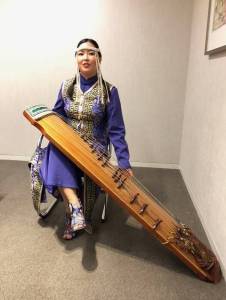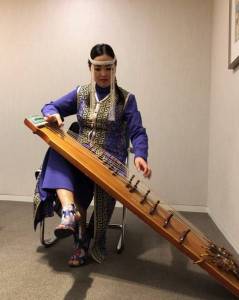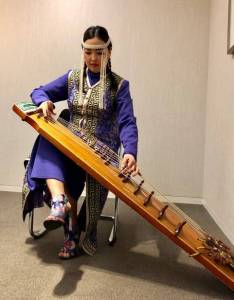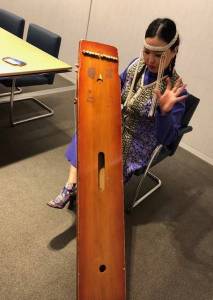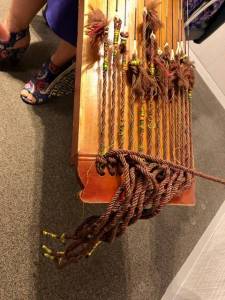How DC Networking Led Me to a Mongolian Harpist
Author: Sophia Schultz
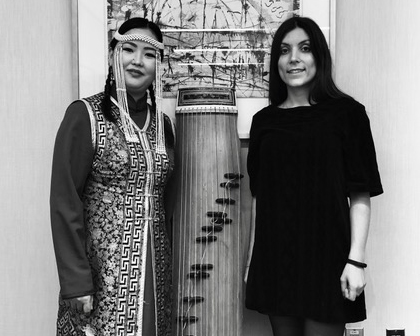
This is why I love DC. You meet and connect with new people so easily, so naturally. I met Felizia, now one of my best friends, more than 10 years ago when we were both participating in the Washington Semester Program at American University. Through her, over the years, I have met many interesting people, some of them are now my close friends. Feli and I kept in touch, having lived in different cities since we first met, and now we’re both back in Washington.
Come and meet us.
Here is a, in my view typical, DC story: Felizia invites me to join a Global Shapers meeting she was hosting. I help a little bit with the set-up to “earn” the privilege of being allowed in and then I have a wonderful time meeting interesting people. One among them is Urgamal, from Mongolia. Urga is wonderful – full of energy, and while she tells you a story there is no way you check your phone or do anything other than stare at her.
A couple of days later, Urga invites me to a networking lunch at the IMF. This is where she introduces me to Oyunsuren Enkh-Amgalan, professional harpist from Ulaanbaatar.
Una, Urga’s sister, who is visiting from Vienna, jumps in as a translator. Oyunsuren tells me about Altai Band: An ethnic-music group of six, playing traditional Mongolian music. In 2016, they were a finalist on “Mongolia’s Got Talent”. The members of her group all learned from their elders (for some, the tradition reaches 3 generations back, for other members, all the way back to the 14th generation in the past). I interrupt: “Who taught you?” “My mother.” Her mother never played professionally, she played at home, but the intimacy of listening to her mother play, watching her handle the instrument with care, sparked a deep interest in Oyunsuren. She is the first one in her family who made music her full-time career.
I am amazed by this because I imagine that it must take courage to convince your parents that you want to take the risk and become a musician. “It wasn’t easy,” she says, but when her parents noticed how dedicated she was and how much effort she put in, they accepted her decision.
Our conversation turned more personal a bit later, as we stood a little farther away from the happily chatting away. I missed her performance earlier, I apologize, and this is when she hints with her eyes that I should follow her. Oyunsuren, Una, and I walk to a private room close by and: Wow, there it is – I have never seen an instrument like hers before (see pictures). All excited, I ask about the maker of the instrument and if there is a story, but she smiles and explains that she borrowed this one from a friend in DC and didn’t transport hers all the way from Mongolia. I learn that her group (Altai Band) bases their performances and concerts on true stories taken from the country’s 4000-year-old history. Oyunsuren has also recently taken on the project to learn how to play a 1400-year-old harp. It’s similar to the one she is playing – not in how it looks, but in how it sounds. “Just a little softer,” she tries to explain.
I turn to Una and ask her if she would go and see an Altai Band concert in Mongolia, her home country, or if that would rather be an occasion where she would take foreign visitors along. “Both,” she says without thinking for long, “it is very interesting for me to learn about my own ancient history. It keeps surprising me.”
I conduct more research for this blog post and realize that the 1400-year-old harp Oyunsuren mentioned is a unique archeological find. The ancient instrument, played by several nomadic tribes, was discovered by Mongolian archaeologists in 2008, in the remains of an ancient tomb in Khovd Province, northwestern Mongolia. “After the excavation, the team handed over the tomb’s findings to a German team for further studies. After years of studying the origin of this musical instrument, the head of Mongolian Ethnic Music Bureau Mr. D. Ganpurev along with music instruments maker P. Baigalijav have recreated a copy […] of the ancient instrument, […] the Altai Harp.”1 Its sound had been lost, but now it’s making a return.
The idea of establishing Altai Band was inspired by the unearthing of the Altai Harp. Its founder Ganpurev emphasizes in an interview that the band is not only ethnic, but indigenous: “All members of Altai Band come from the countryside. They all grew up in a nomadic household […] Altai Band’s expertise in music derives from family traditions […] They weren’t trained in college, but the tradition is in their blood.”2
In the private room we are hiding away in, Oyunsuren sits down to play her yatga (harp instrument). She embraces it, the wood looks soft, adorned by ropes with colorful threads woven into them and small movable wooden pieces that hold up the strings. As she illustrates, these wooden pieces need detailed attention: “Whenever you begin playing again, they will have slightly moved.” Watching her play a short melody, peaceful and calm, makes me think: If she is sad about something in her life, will she feel the urge to sit down and play? After Una translates (I feel bad for asking such a personal question) Oyunsuren nods first at Una and then at me. “Yes, of course.” Then she pulls on one of the strings, stretches it far away from the base of the instrument, and lets it go. The sound echoes vibrantly, and she looks at me with raised eyebrows to see how I react. I watch the humming string, it decelerates, and on she goes and pulls on another one. We don’t have much time, so we get up (Oyunsuren from her chair, I from crouching on the floor) and Una takes a quick photo. Smile!
In the last year alone, Altai Band traveled to 5 different countries – Russia, Germany, China, Austria and Hungary. They receive many invitations from all over the world, and would love to receive even more. Their mission is, of course, not only to preserve traditional music and dance, but also to introduce it to an ever wider audience.
Here a few links if you’re curious to see Altai Band perform live:
https://www.facebook.com/mongolialive.org/videos/1102663046462177/
(A Mother’s Song)
https://www.facebook.com/mongolialive.org/videos/1332158966845916/
(Bennett Konesni & Altai Band)
https://www.facebook.com/Altaimusic/videos/751561181676145/ (The Mother and Warrior Hero – Mongolia’s Got Talent)


